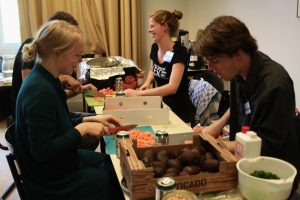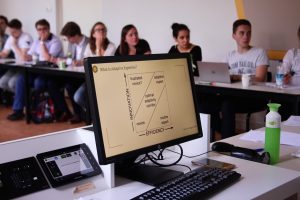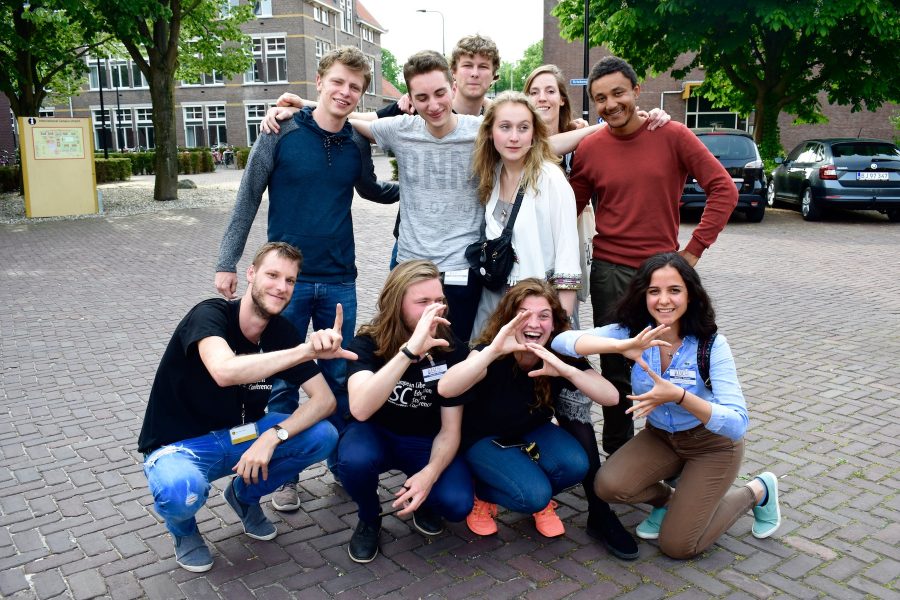One of the privileges and pains of a Liberal Education is that it both encourages and necessitates continual inquiry into its nature and value. Rooted in a rich historical tradition of confusing origins and seemingly contradictory intentions, making sense of a so-called “Liberal Education” is a daunting task that no student should undertake alone… and, thankfully, doesn’t have to. This inquiry has given impetus to LESC — the Liberal Education Student Conference — which has thus far provided a forum for students in the Liberal Arts and Sciences across Europe to come together to discuss the past, present, and potential future of their Liberal Education. Most recently the annual conference was held in Utrecht, drawing 109 participants — four from our own school; next year, rumours have it that LESC is coming to BCB…
Born in 2016 in Lüneburg, Germany, the first LESC inquired: “What is Liberal Education, and what could it be?” About half of the participating students wrote academic papers on the topic prior to the conference which were then discussed in separate groups according to the theme of their papers — namely, Liberal Education in politics and society, the European Liberal Arts context, its potentials and limits, and interdisciplinary educational approaches. [*1] This new initiative was continued the next year by the University College Freiburg. The 2017 conference zoomed in on the real-world relevance aspect of Liberal Education that many of its students inevitably grapple with: “A complex world needs complex thinking: The potentials and limits of Liberal Education in approaching contemporary challenges.” A similar format involving a (preferably) written, (preferably) academic contribution and discussion sessions was adopted in 2017, but this time participants were organised by track sessions addressing a handful of the euphemistically named “complex problems” of the world — namely, human rights and intersectionality, distrust and populism, the future of health, and technology. [*2]
Most recently, the 2018 LESC in Utrecht reflected on Liberal Education itself as seen from a changing society, asking the provocative question: What does our changing society need from Liberal Education, and to what extent is your Liberal Education program providing this? This year, participants could choose from five track sessions, and were again encouraged to write a paper on their topic of choice — be it on migration, privacy, food (- security), climate, or the European Union. All editions of LESC have featured lectures and keynote speeches as well as cultural events that complemented the academic proceedings and helped foster a sense of community.
It was a true privilege to be able to attend LESC 2018 in Utrecht this past May along with Armanda Serwah (BA 2021), Pauline Jäckels (BA 2021) and Marta Vuković (BA 2019). (Though I can’t speak for either of the first two conferences, you can read more on LESC 2017 here, which 2018 alumna Flavia Tienes attended and which was reportedly similarly humbling.) Unsure of what to expect from what was to become my first university conference experience, I arrived in Utrecht with a slight sense of trepidation that was exacerbated by my shortened sleep and sharpened on the acidity of Deutsche Bahn’s coffee. But, as Flavia discovered during LESC 2017, this fear was unfounded. Most participants would agree that LESC 2018 was a “success” — not only because nothing went majorly wrong (no burned-down buildings, no coffee shortage, enough hummus to satisfy my wildest desires etc.), but because it strengthened the relationships of the Liberal Education network and inspired its participants to reflect on their programmes in relation to the other, disparate programmes. More viscerally, though, it was a joy to be there.
It’s impossible to pinpoint exactly what made up the rare atmosphere that saturated the conference proceedings, but, if I were to pick a word, I’d settle on “care”. The conference was put together by students who deeply care for the issues under discussion and for the participants who had come to discuss them. There was great attention to detail and logistics, and even consideration for the environmental impact of our time there. During the registration process, I was met with a big smile and given my very own mug to use during the conference and which I could take home with me. (I cherish it fondly.) Everyone was expected to bring their own dishes — borrowed from our hosts — to mealtimes as there was a zero-plastic-waste policy, and no one was left wondering what to do or where to go because we could all easily get in touch with the conference organizers via the WhatsApp group where they had painstakingly accounted for everyone’s numbers. Not to mention that the organizers themselves cut up the veggies for our lunches and let us sleep in their homes. LESC 2018 was evidently a labor of love.

This care, which had been set in motion many months earlier — arguably years earlier — is what brought the conference into being in the first place and will hopefully sustain it for many more years to come. It was infectious; I couldn’t help feeling like I “belonged”. All of us had chosen to be there and could choose to leave at any time. But why would we, when the discussions — about what mattered, about what we could actually do about what mattered — carried beyond the academic setting, into mealtimes and after conference hours? It was with reluctance and a twinge of brokenheartedness for the friends so quickly made and left behind that I returned to Berlin on Sunday evening.
Yet, one aspect of the conference unsettled me, and it’s taken me these past few months to put this hazy doubt in words. My only serious critique of the conference is of its premise, the central question: What does our changing society need from Liberal Education, and to what extent is your Liberal Education program providing this? As the LESC 2018 concept paper (which can be found on their website) acknowledges, “the central question implies that LE must provide something to society and that society needs something that LE can provide.” It points to how “previous editions have shown that most LE students agree that LE should contribute to solving the greatest challenges of our time” but cautions that “these assumptions should and will be subject to critical deliberation in the conference”. But to what extent were these assumptions critically questioned; to what extent should a Liberal Education provide for a changing society?
Though the conference was framed with lectures and keynote speeches that provided a plurality of perspectives on Liberal Education and which could, potentially, provide a critical perspective on the question at hand, I found that genuine engagement with the underlying assumptions of the question was lacking in discussions: They were, perhaps ironically, unquestioningly swallowed by participants coming from programmes touted for their ability to foster the capacity for ‘critical thinking’ (more on that unicorn, critical thinking, here). I don’t see this as a shortcoming on the participants’ behalf, but rather as a consequence of their proactive and idealistic nature as well as of the structuring of the conference programme around real-world problems, which thematically attracted those who already have a civic orientation and who would consequently be willing to engage with a community on these issues. As we had each been prompted to think about how Liberal Education could be “[improved to] fit our ever-changing, diverse society” in our written contributions submitted prior, and with the ultimate goal of the conference being the creation of two “Master Lists” outlining the democratically-agreed “best practices” and “points of improvement” of a LE in relation to a changing society, this non-critical outcome seems inevitable. [*3]
Though I agree that students who’ve (thoughtfully, effortfully) engaged with a Liberal Education are often well-equipped to engage with the most pressing and complex problems facing our world today, especially those that desire an interdisciplinary approach, I don’t believe that a Liberal Education ought to or should prepare its students to grapple with these issues per se. Rhetoric similar to the one used in the pamphlet for LESC 2017, which suggests that LE programs may — as one of their characteristics — strive to “shape students into responsible citizens who are active in their communities,” is dangerous because it unduly influences the students choice of where they’d ultimately like to place their passion and care. By advertising and analysing, emphasising and highlighting its ‘real-world’ applicability above its other merits, our splendidly indefinable Liberal Education is endangered and the value of learning as a good in and of itself is overlooked. At worst, it becomes a tool with which to funnel a student into activism or advocacy — telling the student what to think and how to act instead of letting them discover how to think for themselves. [*4] When use and pragmatism are prioritised, the freedom to explore one’s own interests and identity through education falls away while Liberal Education falls prey to dogma telling us what’s the right thing to do, what’s the right “shape” to be in order to forward these pragmatic aims.
One conversation I had during a track session activity where we were split into smaller groups sticks in my memory. When trying to figure out how a Liberal Education can connect to and stay in touch with the rest of the world, the conversation turned to civic engagement. One of the participants spoke about the excellent level of student participation in civic engagement projects at her school and asserted that she would integrate civic engagement into the curriculum as a mandatory component. Though I see the value of civic engagement, I disagree that this should be mandatory and suggested that students instead be allowed to pick up the mantle they see fit as making volunteer work compulsory might erode its worth for students who are simply trying to fulfil their credit requirements. Perhaps too optimistically I suggested that a Liberal Education would help students realise their responsibility to their fellow beings, this world, and that it’s counterproductive to force people into an activity they would rather not partake in. To this she replied that “no, they just won’t do it [if they are not required to]” and that they would best learn its value first-hand. I agree that hands-on experience can be motivating, but I think that this solution to a lack of civic engagement is superficial — like a bandaid on a broken arm — and that there are other ways to serve one’s society that don’t necessarily fall under the category of “civic engagement.” The conversation was never quite settled, but I was left with the feeling that I held an unpopular opinion.
The keynote that seemed to speak most directly to my concerns was Volker Balli’s, the director of the Studium Individuale in Lüneburg. Though he emphasised the ‘worldliness’ of a Liberal Education, his analysis of its value was not constrained to this. As the LESC 2018 final conference report helpfully summarises: “He mapped out his talk through three focal points: individuality, community, and diversity.” He claimed that individuality is important in the European liberal arts as “the education approach is about the freedom to explore who you are, about choice in programs to identify what you are interested in, and about responsibility and leadership.” He spoke of the importance of community and diversity, but that the dangers of prioritising these facets too much are either that a LE can become totalitarian (a ‘bubble’ of liberal opinions) or dogmatic (where plurality is more important than the issues being discussed). I found Balli’s talk inspiring and optimistic yet cautious and realistic. Coming near the end of the conference, these words provided the balanced perspective I felt had been missing from many of the other activities I participated in.
To attempt to summarise all the stimulating discussions, keynotes, and lectures in a few sentences or paragraphs would do the conference proceedings a great injustice, and as a whole I found the experience invaluable. At its core, my main critique is not of the conference itself, but has to do with the difference between the responsibility of the educational system versus the responsibility of the student, which the focus of the conference prompted me to reflect on: I believe that it is the system’s responsibility to allow and encourage the flourishing of the individual, as Balli noted, but that is both the privilege and responsibility of the student to take this knowledge and these skills into the world. I find the flexibility of a Liberal Education, the impossibility of defining it or tying it to one particular goal — which external parties often seem to view as a weakness — to paradoxically be one of its greatest defining strengths. If you want, it can be an entrypoint into activism; it can help you analyse and dismantle oppressive structures; it can be a way to enrich your own knowledge and understanding of history, the world, other people; it can be all of this or none of it, depending on what you choose to make of it.

Anyone who is even vaguely familiar with the history of Liberal Education knows that the debate behind its purpose and best practices goes back a good long while. It is one of the main points of divergence between what Ria van der Lecq, former academic and the founder of LAS (Liberal Arts and Sciences) Utrecht, described as the “oratorical” and “philosophical” traditions from which the modern understanding of a LE is derived. While the oratorical tradition emphasises the use of knowledge for the public good, the philosophical tradition argues the pursuit of knowledge in itself is the greatest good (though this does not preclude putting knowledge to good use). Van der Lecq makes the argument that nowadays a LE tends to combine these two approaches and its students are ideally distinguished by the qualities of “flexibility, creativity, open mindedness, [an orientation toward the] common good, and the willingness to tolerate ambiguity.” [*5]
Still, the nature and purpose of a Liberal Education is far from clear, not least to its students. The desperate striving to prove the worth of a Liberal Education to ourselves and society at large is, I suspect, in part a consequence of the nature of the capitalistic apparatus that is moving our societies forward GDP-wise — a Liberal Education must be marketed in order to survive. And how would it possibly sell? A Liberal Education student must be marketable (as possessing a certain skill set, a certain virtuous orientation) if they or their parents are going to invest in it. It is also, perhaps, a push-back against the accusation that a LE is out of touch with society’s needs. But, most encouragingly, I’d suggest that this mindset develops as a consequence of the realisation that with the privilege to undertake a Liberal Education comes the very real responsibility to put it to (good) use. I don’t believe a LE institution ought to be an ivory tower or a bubble far removed from the concerns of a changing society. I am not claiming that education should be (or ever truly could be) apolitical, or an end in and of itself: This would be empty and impossible as we can’t help but construct meaning from what we learn and are pragmatic creatures to our core.
Through this critique, I am not absolving anyone of the responsibility they bear to the societies that have enabled their education. I’m rather trying to point out that confusing the outcomes of a Liberal Education with the necessary actions of the Liberal Education students themselves is a mistake: It puts the education system before the individual and thus absolves the individual of responsibility for the outcomes of that system. As Flavia so sagely put it in her own article on LESC 2017: “Engaging with a liberal education is a good step in the right direction, but it is not a free ticket to responsible citizenship.” With this in mind, I’d suggest a subtle but vital amendment to the central question. Instead of “What does our changing society need from Liberal Education, and to what extent is your Liberal Education program providing this?” we must ask “What does our changing society need from students of Liberal Education, and to what extent can and should Liberal Education students provide this?” This is a question we must all keep asking ourselves — not what our Liberal Education can give the world, but what we can make of it.
Note: Keep an eye out for more information on how to help organise LESC 2019 — conceptually, logistically, or otherwise. Now the question of our education is in our hands!
[*1] https://1stlesc.wordpress.com/call-for-proposals-2/
[*2] https://2ndlesc.wordpress.com/startseite/speaker-experts/program/
[*3] If you’re curious about the best practices and points of improvement, see pages 3 to 4 of the final report: https://lesconference.files.wordpress.com/2018/07/final-report-lesc-2018.pdf
[*4] This is not to say that activism and advocacy aren’t perfectly legitimate endeavours. Fellow blog contributor Elena Gagovska makes an excellent case for the value of activism in her 2017 article on Trumponomics.
[*5] Summary of all speeches found on pages 44-46 of the LESC 2018 final report https://lesconference.files.wordpress.com/2018/07/final-report-lesc-2018.pdf

